It had been a hard weekend, with all the games being fairly challenging and the last 2 having been particularly hard fought battles. Our final result was 64 VPs, and 2nd Place – probably not bad for a team made up of a first time DBMM’er (Campbell) and a notorious over-aggressive under-achiever (i.e. Me)! Ivan & Andrew did magnificently to win, although I think the huge Warband force (69 German and 14 Gallic Warband elements) may have overawed some people (see BC’08 Round 1: Early German Cimbri & Tigurini Gallic Allies 102BC Report)! John & Lance with their Sassanids and Brett & Lawrence with the Medieval Germans also did well and it was a constant tussle each round with two of these 4 teams in first and second place after each of the rounds (Ivan and Andrew managing to be first in the third round and stay there, being 1st after the most critical one, the last)!
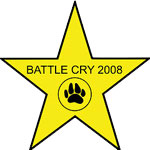 Philip & Andrew get a special mention in dispatches, for both having the “most ancient” army present, and giving the Sassanids (with all their Elephants, Knights, and (S) Cavalry) a real run for their money (eventually only losing 7-18), and then giving the Medieval Navarrese a jolly good taste of Egyptian Steel (winning 21-4), or should that be Egyptian Bronze?! The remaining teams all fought well, especially since 2 of them were (as I understand) composed of DBMM initiates; but I’ll leave Wayne, the Navarrese C-in-C, probably the player most experienced with DBMM to date in the competition, to explain the Navarrese performance some other time and place!
Philip & Andrew get a special mention in dispatches, for both having the “most ancient” army present, and giving the Sassanids (with all their Elephants, Knights, and (S) Cavalry) a real run for their money (eventually only losing 7-18), and then giving the Medieval Navarrese a jolly good taste of Egyptian Steel (winning 21-4), or should that be Egyptian Bronze?! The remaining teams all fought well, especially since 2 of them were (as I understand) composed of DBMM initiates; but I’ll leave Wayne, the Navarrese C-in-C, probably the player most experienced with DBMM to date in the competition, to explain the Navarrese performance some other time and place!
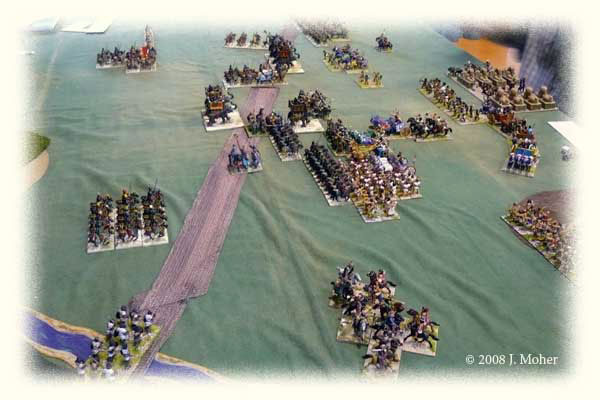
Needless to say BattleCry and the 25mm Doubles are always a good experience and well worth the entry fee – and there is always plenty of loot to take away too! So its an event well worth attending and the first year using DBMM was a great success (and hopefully the first of many).
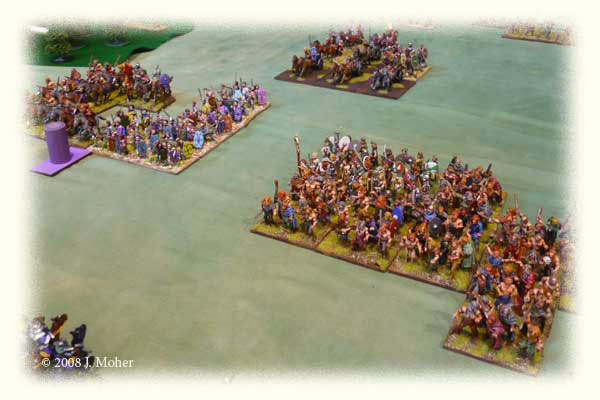
All the games were a challenge in various ways and really reinforced the fact that I like DBMM and it definitely seems a good evolutionary step from DBM that creates battles that to me look and feel how we understand ancient battles to; and also generally behave how we believe they probably behaved. Reserves are important, if not downright vital, as is having a simple plan and avoiding unrealistic complicated manoeuvres – which are both strong positives for any historical simulation.
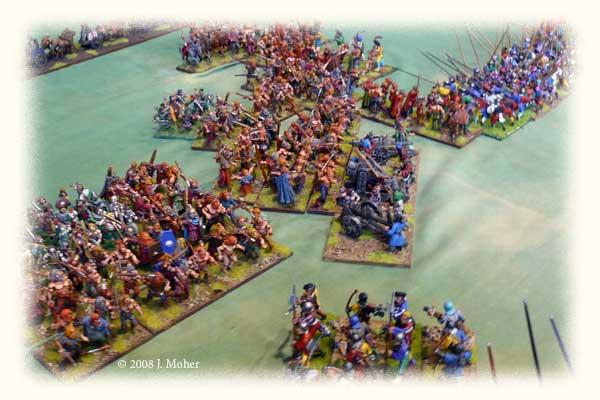
Final Tournament Rankings & Results
| Team | Army | Year | Points | OD | R1 | R2 | R3 | R4 | |
|---|---|---|---|---|---|---|---|---|---|
| 1 | Ivan Truong & Andrew Fergus | Early German Cimbri, Tigurini Gallic Allies | 102BC | 78 | 192 | 11 | 23 | 25 | 19 |
| 2 | John Moher & Campbell Millar | Eastern Early Imperial Romans, Armenian Allies, Inert C-in-C | 62AD | 64 | 231 | 14 | 25 | 15 | 10 |
| 3 | John Calnan & Lance Knighton | Sassanid Persians, Sabir Hun Allies | 463AD | 59 | 183 | 15 | 11 | 18 | 15 |
| 4 | Brett Preston-Thomas & Lawrence Antill | Medieval Germans, Swiss Allies | 1478AD | 52 | 219 | 11 | 25 | 10 | 7 |
| 5 | Danny Wriggley & John Way | Medieval Scandinavian Union, Swedish Allies | 1487AD | 48 | 217 | 14 | 14 | 0 | 20 |
| 6 | Philip Abela & Andrew Hunter | Kushite Egyptian | 700BC | 42 | 180 | 14 | 0 | 7 | 21 |
| 7 | Wayne Watts & Brett Watts | Navarrese, Free Company Allies | 1357AD | 29 | 181 | 10 | 0 | 15 | 4 |
| 8 | Gerard Lelieveld & Dan Harwood | Seleucid, Aitolian Allies, Brilliant C-in-C | 190BC | 28 | 197 | 11 | 2 | 10 | 5 |
Points: Total Score out of a possible 100 (i.e. 25 VP maximum for each of the 4 games).
Opponent Difficulty (OD): A Buchholz style challenge ranking based on the final competition scores of the 4 opponents each team played. The higher the score the tougher the opponents faced (in theory), ideal for breaking ties in final points if needed. Also gives an indication to some degree of opponent challenge.
Round Scores (R1, R2, R3, R4): The individual Victory Point Scores for each team’s game in each round. Scores of 10-15 are draws, everything above is a win, everything below a loss. The winning team achieved 3 wins; the next 5 placed teams had 1 win apiece – total for the entire competition was 8 Wins & 8 Draws from 16 Games. About half those draws probably due to lost time or slow set-up by inexperienced players so generally fairly decisive results are possible in 4 hour games.
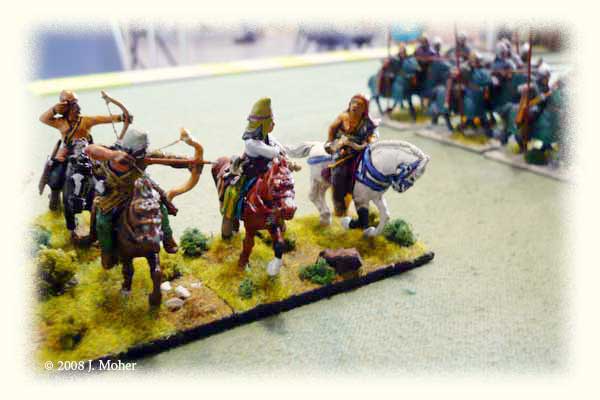
Continue to BattleCry 2009 Introduction.
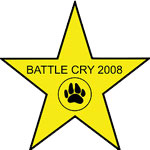
One thought on “BC’08 Conclusion: Results & Aftermath”